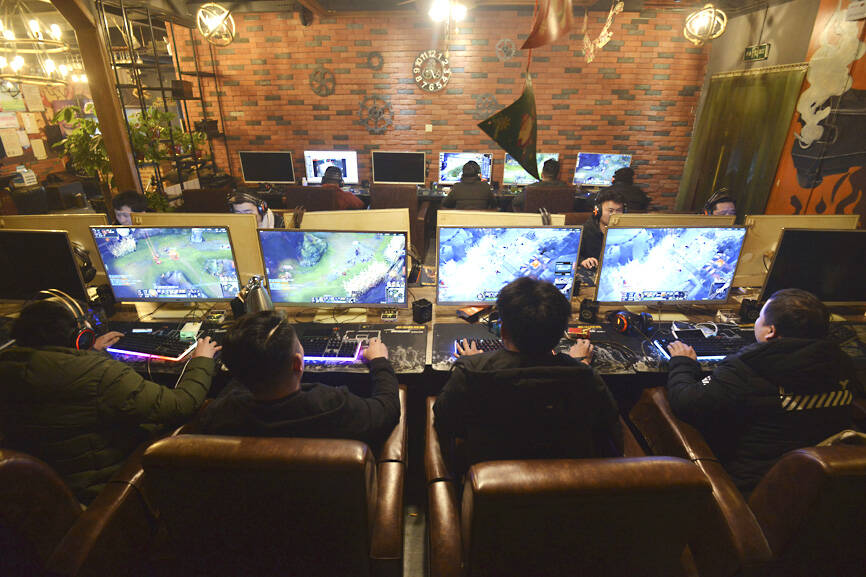China yesterday approved 105 domestic games, the latest indication that Beijing is softening its stance after its move to tighten industry restrictions led to a US$80 billion rout last week.
The titles included those operated by Tencent Holdings Ltd (騰訊) and NetEase Inc (網易), China’s two leading game publishers, which were pummeled by Beijing’s new rules.
The approvals show that Chinese authorities support the development of online gaming, an industry association wrote in a post on WeChat that was republished by the state-run Xinhua news agency.

Photo: AP
Chinese officials rekindled fear that they would start another round of tech crackdowns after China’s top gaming regulator, the National Press and Publication Administration (NPPA), announced on Friday new rules to limit the development of online games, including an unspecified cap on spending by adult players.
Additional restrictions include a ban on rewards for frequent log-ins and forced player duels, and even a prohibition on content that risks national security.
As Tencent and NetEase saw their market value plunge by tens of billions of dollars in Hong Kong on Friday, the NPPA announced during trading hours the approval of 40 imported gaming titles, including those operated by the two companies. The move did little to help restore investors’ confidence.
The administration on Saturday said that it would listen to feedback from stakeholders including companies and players to improve the rules.
The sweeping restrictions, announced before Christmas, reminded many of the brutal tech-sector crackdown of 2021. That year, Chinese agencies abruptly imposed curbs on sectors from e-commerce to entertainment, while decimating the online education industry by declaring profits illegal.
“The latest events reflect the government’s desire for a larger, more diverse gaming landscape with innovative content of a higher quality, but one without excessive monetization or pay-to-win games,” Shanghai-based games studio Paper Games (疊紙) senior vice president Yang Wenfeng (楊文峰) said. “The government prefers publishers to earn profits through fair practices and product innovation, rather than deepening monetization strategies.”

When an apartment comes up for rent in Germany’s big cities, hundreds of prospective tenants often queue down the street to view it, but the acute shortage of affordable housing is getting scant attention ahead of today’s snap general election. “Housing is one of the main problems for people, but nobody talks about it, nobody takes it seriously,” said Andreas Ibel, president of Build Europe, an association representing housing developers. Migration and the sluggish economy top the list of voters’ concerns, but analysts say housing policy fails to break through as returns on investment take time to register, making the

‘SILVER LINING’: Although the news caused TSMC to fall on the local market, an analyst said that as tariffs are not set to go into effect until April, there is still time for negotiations US President Donald Trump on Tuesday said that he would likely impose tariffs on semiconductor, automobile and pharmaceutical imports of about 25 percent, with an announcement coming as soon as April 2 in a move that would represent a dramatic widening of the US leader’s trade war. “I probably will tell you that on April 2, but it’ll be in the neighborhood of 25 percent,” Trump told reporters at his Mar-a-Lago club when asked about his plan for auto tariffs. Asked about similar levies on pharmaceutical drugs and semiconductors, the president said that “it’ll be 25 percent and higher, and it’ll

CHIP BOOM: Revenue for the semiconductor industry is set to reach US$1 trillion by 2032, opening up opportunities for the chip pacakging and testing company, it said ASE Technology Holding Co (日月光投控), the world’s largest provider of outsourced semiconductor assembly and test (OSAT) services, yesterday launched a new advanced manufacturing facility in Penang, Malaysia, aiming to meet growing demand for emerging technologies such as generative artificial intelligence (AI) applications. The US$300 million facility is a critical step in expanding ASE’s global footprint, offering an alternative for customers from the US, Europe, Japan, South Korea and China to assemble and test chips outside of Taiwan amid efforts to diversify supply chains. The plant, the company’s fifth in Malaysia, is part of a strategic expansion plan that would more than triple

Taiwanese artificial intelligence (AI) server makers are expected to make major investments in Texas in May after US President Donald Trump’s first 100 days in office and amid his rising tariff threats, Taiwan Electrical and Electronic Manufacturers’ Association (TEEMA, 台灣電子電機公會) chairman Richard Lee (李詩欽) said yesterday. The association led a delegation of seven AI server manufacturers to Washington, as well as the US states of California, Texas and New Mexico, to discuss land and tax issues, as Taiwanese firms speed up their production plans in the US with many of them seeing Texas as their top option for investment, Lee said. The